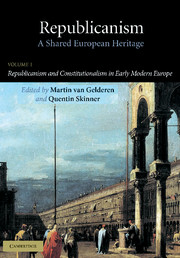Book contents
- Frontmatter
- Contents of Volume I
- Contents of Volume II
- Acknowledgments
- Introduction
- Part I The Rejection of Monarchy
- Part II The Republican Citizen
- Part III The Republican Constitution
- 9 From the Crisis of Civil Culture to the Neapolitan Republic of 1647: Republicanism in Italy between the Sixteenth and Seventeenth Centuries
- 10 Aristotelians, Monarchomachs and Republicans: Sovereignty and respublica mixta in Dutch and German Political Thought, 1580–1650
- 11 Debating the respublica mixta: German and Dutch Political Discourses around 1700
- 12 Classical Foundational Myths of European Republicanism: The Jewish Commonwealth
- 13 Republican Politics in Early Modern Spain: The Castilian and Catalano-Aragonese Traditions
- 14 The Idea of a Republican Constitution in Old Régime France
- 15 Republicanism, Regicide and Republic: The English Experience
- Bibliography
- Contributors
- Index of Names of Persons
- Index of Subjects
11 - Debating the respublica mixta: German and Dutch Political Discourses around 1700
Published online by Cambridge University Press: 15 December 2009
- Frontmatter
- Contents of Volume I
- Contents of Volume II
- Acknowledgments
- Introduction
- Part I The Rejection of Monarchy
- Part II The Republican Citizen
- Part III The Republican Constitution
- 9 From the Crisis of Civil Culture to the Neapolitan Republic of 1647: Republicanism in Italy between the Sixteenth and Seventeenth Centuries
- 10 Aristotelians, Monarchomachs and Republicans: Sovereignty and respublica mixta in Dutch and German Political Thought, 1580–1650
- 11 Debating the respublica mixta: German and Dutch Political Discourses around 1700
- 12 Classical Foundational Myths of European Republicanism: The Jewish Commonwealth
- 13 Republican Politics in Early Modern Spain: The Castilian and Catalano-Aragonese Traditions
- 14 The Idea of a Republican Constitution in Old Régime France
- 15 Republicanism, Regicide and Republic: The English Experience
- Bibliography
- Contributors
- Index of Names of Persons
- Index of Subjects
Summary
In the last three decades of the seventeenth century the crisis of Political Aristotelianism deepened (see Dreitzel 1988 and the previous chapter in this volume). The repercussions for the debates on the respublica mixta were profound. On the European continent the traditional theory of the mixed constitution had remained vibrant in the regions and territories where the estates had retained their influence through forms of political representation. The theoretical debates reflected the various constellations of political interests. Mixed constitutions were named after the dominating element. The constitution that mixed monarchy with aristocratic elements in the form of representative assemblies was labelled monarchia sc. mixta. The long debates on the structure and possibilities of mixed constitutions featured a combination of three images. The image of various social groups having different sovereign rights and the fundamental assumption that the mixed constitution should be a balance of three possible elements, the monarchical, aristocratic and popular, led to the question whether the political system should be based on a mixture of just two or all three of these elements. The second image was one of cooperation between the various institutions, persons and groups in the division of sovereign rights. The third image was that of the division of power. It was suggested that it would be possible to distribute the individual, functional parts of sovereignty, of iura maiestatis, among various institutions and persons.
- Type
- Chapter
- Information
- RepublicanismA Shared European Heritage, pp. 219 - 246Publisher: Cambridge University PressPrint publication year: 2002
- 1
- Cited by



